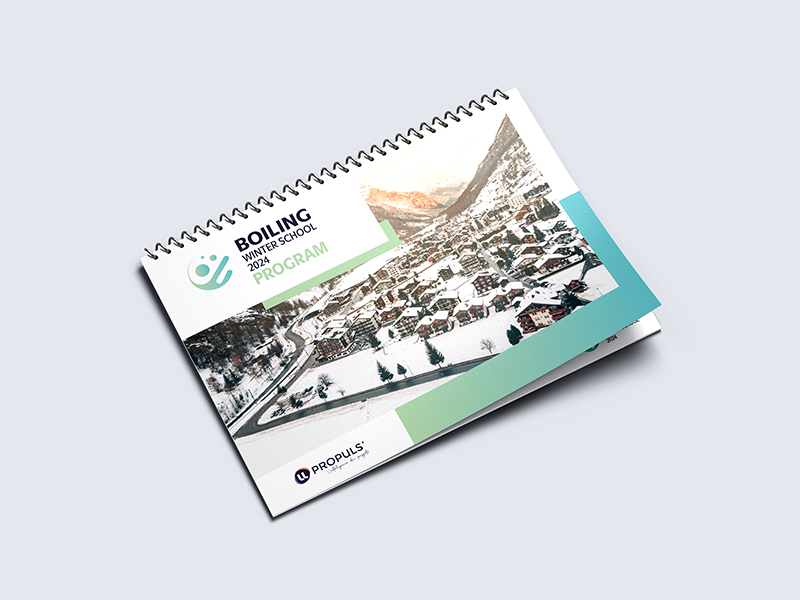PROGRAM
DISCOVER THE PROGRAM
Language
Classes can be held in French or English, depending on the instructor and the audience. Written documents and presentations will be in English.
Dates & Hours
Please plan to arrive the day before (Sunday 15th). Classes start on Monday morning and end on Friday at noon.
Shuttle
A shuttle is scheduled to depart from Chambéry train station on Sunday, December 15th, at 5:00 PM, exclusively for those who have made a reservation.
DOWNLOAD THE PROGRAM
The program is finally online! Don’t wait any longer to check it out.
Phase Change Thermodynamics and Interface Thermodynamics (2h)
Nicolas Rimbert, LEMTA, Univ. Lorraine
- First and second laws of thermodynamics
- Thermodynamic potentials and thermodynamic equilibrium
- Continuity of liquid and gaseous state (Van der Waals Equation of State)
- Corresponding state theorem and Maxwell lever rule
- Interface thermodynamics
- Surfactants
Classical Nucleation Theory (2h)
Benoit Stutz, LOCIE, Univ. Savoie
- Equilibrium and stability of a steam nucleus in a metastable fluid
- Homogeneous nucleation
- Heterogeneous nucleation
- Activation and resorption of pre-existing seeds
- Density of nucleation sites
- Case studies
Balance equations (4h)
Antoine Gerschenfeld, CEA, Saclay
- Derivation of the averaged multiphase balance equations in their 3D and 1D form
- Remarks on their behavior in practice
- Algorithms for solving these equations numerically.
Bubble growth and dynamics (2h)
Vadim Nikolayev, CEA, Saclay
- Single bubble and collective effects
- Boiling cycle: from one nucleation to another
- Bubble interface regions: dome, microlayer, microregion
- Bubble growth stages: interface evolution and hydrodynamics
- Modeling bubble growth: Scriven problem
- Mechanistic modeling of bubble growth and departure
- Near-wall phenomena: contact line and microlayer growth regimes
- Wetting phenomena and evaporation (hysteresis, dynamics, etc.)
- Bubble growth as a multiscale phenomenon
Boiling around the critical point (1h)
Vadim Nikolayev, CEA, Saclay
- Slowed down boiling crisis in reduced gravity
- Boiling crisis: dry spot spreading dynamics
- Magnetic gravity compensation experiments: critical heat flux scaling
- Experiments on board of the International Space Station (DECLIC)
Pool boiling (2h)
Romuald Rulllière, CETHIL, Insa Lyon
- Regimes of pool boiling (boiling curves)
- Nucleate boiling regime: nucleation, bubble dynamics and heat transfer
- Critical heat flux
- Film boiling regime
- Parametric effects
Convective boiling (4h)
Catherine Colin IMFT, Univ. Toulouse & Pierre Ruyer, IRSN, Cadarache
- Flow regimes (phenomenology and models)
• Hydrodynamical regime
• Thermal regime
• Transition criteria - Illustrative examples
• Evaporators
• Thermosiphon loop
• Transient conditions
Numerical methods (4h)
Sébastien Tanguy, IMFT, Univ. Toulouse, & Benjamin Duret, CORIA, Univ. Rouen Normandie
- Importance of interface deformations and topology changes in the context of liquid-vapor phase changes
- Interface tracking method (LS, VOF)
- Projection method for incompressible two-phase flows without phase change
- Numerical methods to handle jump conditions at the interface (GFM, CSF…)
- Phase change: governing equations and jump conditions
- Advanced numerical methods dedicated to phase change (GFM, Aslam, imposing Dirichlet, Neumann and Robin boundary condition at the interface)
- Validation / benchmark
- Phase change modelling at the contact line – coupling with conjugate transfer
- Compressible solver for phase change simulation in non-isobaric conditions (pool cavitation, hydrodynamic cavitation)
Experimental methods (4h)
Matteo Bucci, MIT, Cambridge & Matevz Zupancic, Ljubjana Univ.
Wall measurement (Matteo Bucci, MIT, Cambridge, 2h)
- Infrared thermometry principle
- Measurements of time-dependent temperature and heat flux distribution on boiling surface
- Imaging of the phase in contact with the surface
- Microlayer thickness measurement
- Liquid film thickness measurement for two-phase flows
- A short intro on two-phase flow measurements: optical measurement of liquid temperature, and void fraction distributions using optical probes, wire mesh sensors, gamma and x-ray tomography
Surface Structuration (Matevz Zupancic, Ljubjana Univ., 2h)
- In this lecture, we will first briefly explore the fundamentals of the nanosecond laser texturing technique, which has recently proven to be an effective method for creating active nucleation sites for water pool boiling applications. Special emphasis will be placed on the hydrophobization techniques of these textured surfaces, as well as the development of biphilic patterns that can further influence bubble nucleation temperature. We will present various experimental evidences, including investigations of single bubble dynamics and transient wall temperature measurements during boiling on thin metal foils. Finally, we will discuss the effectiveness, repeatability, and robustness of these surfaces for their utilization in thermal applications.
Special Topics: High Pressure Boiling (4h)
Vapor Explosion (Renaud Meignen, IRSN, Cadarache, 2h)
- General presentation of FCI and Vapor Explosion
• Issues for nuclear safetY
• Other contexts - Potential mechanisms for the pressure build-up
- Thermodynamic models
- thermal detonation models
- Boiling in supercritical conditions
• Differences between water and sodium
• Film boilinG - CFD models – code MC3D
- On DNS technic for the resolution of the issue
High Pressure Boiling (Matteo Bucci, , MIT, Cambridge 1h)
- Experimental challenges of high-pressure flow boiling in LWR conditions
- Measurements and mechanistic modeling of fundamental boiling parameters at LWR conditions
- Open challenges for experimentalist and modelers.

